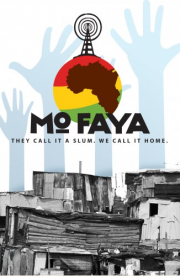Reviewed by Margaretta wa Gacheru
“They call it a slum. We call it home.” [The slogan on the back of each miniature Kenyan flag placed on every single seat of the TRG Theater in Manhattan before all six shows staged during the New York Musical Festival]
[The slogan on the back of each miniature Kenyan flag placed on every single seat of the TRG Theater in Manhattan before all six shows staged during the New York Musical Festival]
Mo Faya is a Kenyan masterpiece and Eric Wainaina— the show’s composer, lyricist, script writer and delectable DJ Luanda around whom the show’s storyline revolves– is a genius.
But then, one more mark of genius is knowing how to surround yourself with brilliant partners, and Wainaina has done just that: first by making his mate Sheba Hirst the show’s producer and John Sibi-Okumu his super-fine director, and then assembling an incredible cast, including award-winning actors and singers like Peter King and Mumbi Kaigwa, Dan ‘Chizi’ Aceda and Valerie Kimani, as well as a marvelous Kenyan band that features Marvin Maveke, Emmanuel Mkuwa, Isaac Mugunda and Patrick Nanjero.
It didn’t hurt that Wainaina also got Safaricom to sponsor the full cast, band and crew’s going to the New York Musical Festival where Mo Faya opened in its world premier September 29 and ran six times in a global showcase that features a score of original world class new productions, most of which came from the US, but at least three came from the South: from Kenya, South Korea and Mexico! Mo Faya will also give one final American performance organized at Bard College by Binyavanga Wainaina, before the cast comes back to Kenya to open in this not-to-be-missed musical production at the GoDown for several shows.
Set in the “slum” shanty town of Kwa Maji, the stars of Mo Faya are all slum dwellers, apart from villainess Anna Mali (Mumbi Kaigwa) whose NGO, called C.U.R.E, aims at the kind of “urban renewal” that Kenyans have seen when local slums have gone up in smoke and sites like Muroto have been razed to make way for sky-scrapers and high rises where poor people won’t be welcomed at all.
Writing in the same satirical vein as a Wahome Mutahi or a Ngugi wa Thiong’o, who both used humour, irony and satire to expose the corruption and contradictions in Kenyan society today, Wainaina similarly doesn’t shy away from talking about hot topics, like land grabbing, lust and dirty linkages between corrupt politicians, cops and even members of the non-governmental community.
Yet the show doesn’t just focus on corruption [although as an expose of the inner workings of Kenya’s corrupt power elite, Mo Faya may make some local politicians feel quite uncomfortable.] On the contrary, the star of the show in a sense is ‘the slum’ Kwa Maji itself – and the everyday lives of the people who reside therein.
Capturing the creativity, dynamism and vitality of those poor people’s lives through pop music [including reggae and Kenyanized hip hop] and well choreographed dance, Mo Faya shows the centrality of local FM radio in the lives of people who may not afford dish satellite or downtown cinema shows, but who love to laugh and be entertained artistically nonetheless.
Yet the exploitative spirit of both governmental and non-governmental politicians is never far from the lead storyline, since even the beautiful sense of community that these poor people share is corruptible in the scheming land-grabber’s mind. In fact, when the self-proclaimed “Total Woman” Anna Mali aims to destroy the people’s sense of solidarity prior to her pushing them off the land they call home, she goes after the people’s hero, DJ Luanda.
Tempting him to leave community radio for “Big City radio” with its fatter salary and higher public profile, DJ Luanda sadly takes the bait. But his departure signals a weakening of the people’s sense of social cohesion and solidarity, something Luanda has previously embodied for them.
Anna Mali’s partner in crime, the mungiki-like-monster Mkwajo [played masterly by Peter King], proceeds to sow the seeds of terror in Kwa Maji with a slew of mysterious murders, all part of Mali’s malevolent master plan to make over the slum into an up-market income generator for her and her corrupt colleagues, including the police chief (Joshua Mwai) and the politician (Daniel Mwashigadi).
I won’t tell you how the story ends since Kenyans will have to see the show for themselves, and I won’t be the spoiler who gives the ending away. But I will say the script is brilliant and the casting superb.
One genuine stroke of genius that I credit Wainaina with is the ensemble nature of this show. It’s as if his cast were a jazz band, wherein every instrument, every cast member, has his or her moment to showcase her/his talent, be it as a dancer, a singer, and more often than not, as both!!
Sibi-Okumu undoubtedly had something to do with enhancing the ensemble-aspect of the show, since he worked hand in hand with Wainaina and the cast for weeks before heading to New York, honing the script down to a manageable size and form. And as for the cast, I can’t speak about every single member although everyone, especially Valerie Kimani, DJ Luanda’s sweetheart, has an especially important role to play in this multi-layered modern day morality musical. The other cast member who holds the show together with finesse, charm and style is the Professor, played by Dan ‘Chizi’ Aceda, since he not only takes the time at the outset of the show to artfully introduce every Kwa Maji community member; he also steps in at pivotal moments to provide the continuity required, especially for audiences who may not speak Kiswahili, meanwhile about a third of the show is conveyed in it
Relying on a minimalist set design and ordinary street clothes and kitengis for costumes, it is the music of Mo Faya that makes the show so distinctively Kenyan [the music and of course, the dancing that goes so rhythmically with it]. For however much critics may claim that Kenyan music is ersatz African American, Wainaina proves that Kenyan culture and creativity is no copy cat.
The show makes a powerful statement about the ills Kenyan society faces. But it also reveals the rich resiliency and resourcefulness of the people. What Wainaina didn’t provide was a solution to Kenya’s political plight and moral malaise. But his ending is provocative and somehow hopeful.
What is most marvelous about this show is that Kenyans will have an opportunity to see Mo Faya themselves when it returns home and premiers in November on the Kenyan stage.
For more details on the New York Musical Theater Festival, visit http://www.nymf.org.
